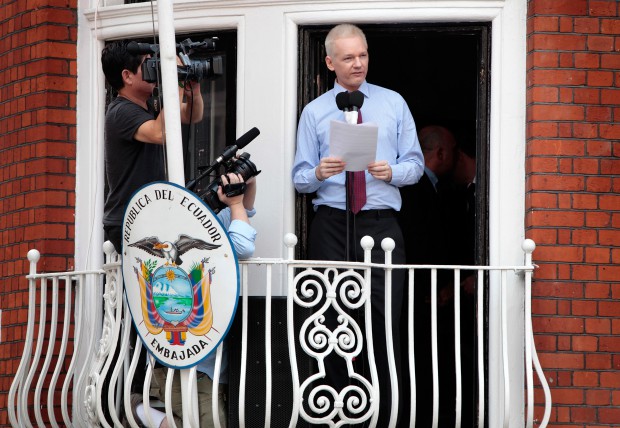‘This film would not have been possible without the following encryption tools,’ is one of the least expected film credits I can think of. But then again, Laura Poitras’s Risk is not exactly your run-of-the-mill documentary. After her Oscar-winning Citizenfour, a gripping hour-by-hour account of Edward Snowden’s NSA surveillance disclosures from his Hong Kong hotel room, Poitras’s latest is an intimate portrait of WikiLeaks founder and editor-in-chief Julian Assange.
Poitras started filming Assange at work in 2010 and her film follows the whistleblower’s mission and his various legal travails since then. As a result, Risk is far less dramatically sensational than Citizenfour, which unfolds over the course of several history-making days. Since so much of the material in Risk was shot before Poitras met Snowden (in 2013), it often feels like a prequel to Citizenfour. It is also a much more conventional documentary, with a clear message (‘Free Assange!’).
Three of the ten chapter that make up Risk screened at last year’s New York Film Festival under the working title Asylum. The full documentary, screening for the first time at Cannes this year, was originally designed as a series of short segments for the internet, in keeping with WikiLeak’s open source ethos. At a brisk 84 minutes, we’re talking about ten very short chapters. As a result, the film feels somewhat disjointed, although the behind-the-scenes look at the WikiLeaks team is consistently absorbing. Poitras doesn’t so much find a narrative arc as use the one given to her by Assange’s life over the past five years. While Risk refrains from passing any editorial judgment on Assange, the film, if not exactly a hagiography, is clearly very much on his side.
The film doesn’t really offer up any valuable new information. And while I’m glad Poitras brings us into Assange’s various hideouts in England, including the Ecuadorian embassy in London where he has been granted asylum for the past three-and-a-half years, I wish her film gave more insight into Assange, whistleblowing hero, dangerous criminal, bit of both – a complex, charismatic man. I’m not sure Poitras herself realizes how much of a puzzle her subject is. In the scenes of the WikiLeaks team at work and play, Assange comports himself like a guru with his younger colleagues, Sarah Harrison and Jacob Appelbaum. More than Assange, Appelbaum – an American citizen currently in exile in Berlin – is the film’s most articulate and convincing spokesman for WikiLeaks, far more that Assange, who often comes across as self-important. ‘I’m obsessed with our political struggle. I’m not a normal person,’ he says in one of his more dramatic moments.
Like Citizenfour, the most riveting part of Risk takes place in a hotel room, with Assange assuming a disguise before he jets off for the Ecuadorian embassy, which is total James Bond. Aside from this spectacular getaway, the film’s highpoint is an unexpected cameo from Lady Gaga, who comes to interview Assange in the embassy. He’s a surprisingly good sport as she asks her valley girl questions. ‘So, who’s after you?’ she asks him, sticking her point-and-shoot camera in his face. As Assange rattles off a long list of various international organizations that would love to lay hands on him, she interrupts him and says, ‘So basically a lot of people.’






Comments